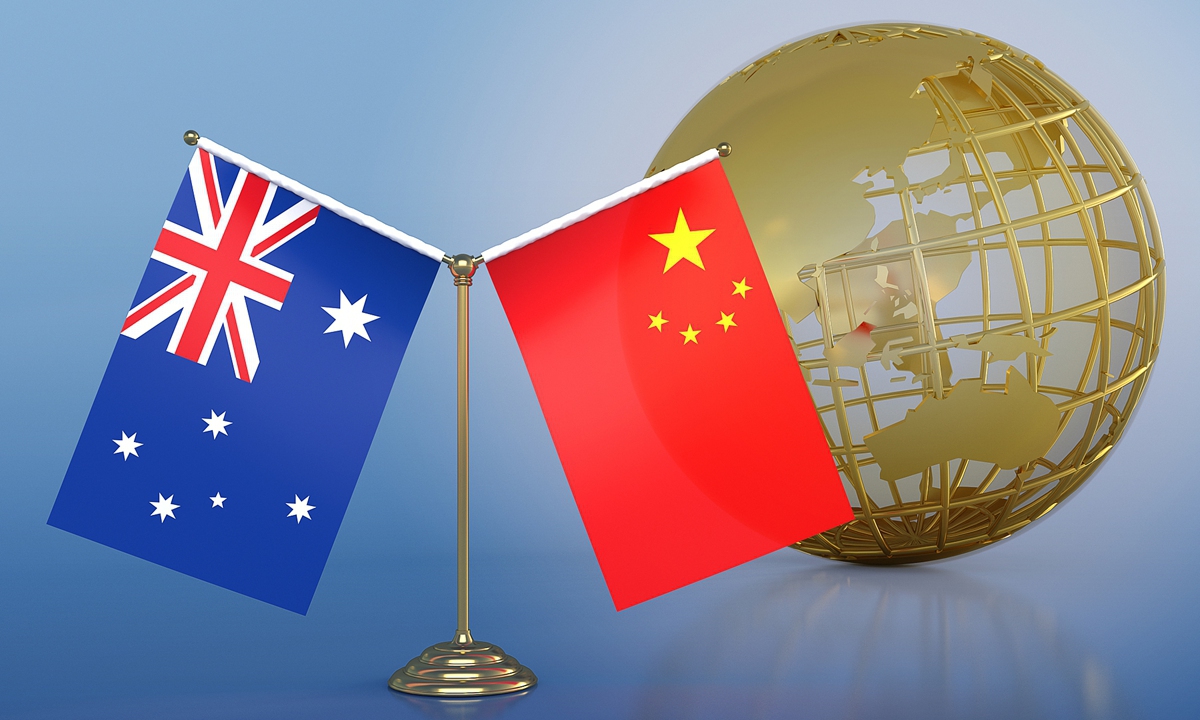
China Australia Photo: CFP
China-Australia relations have showed a momentum of stable and sound development. As an important window has opened up in economic and trade relations, hopefully the Australian side can meet China halfway, properly handle friction and disputes through dialogue on an equal footing, and provide a stable, fair and transparent business environment for Chinese enterprises.
An Australian industry, government, academic and media delegation is scheduled to visit China for a high-level dialogue with Chinese counterparts on Thursday. This is first time for the dialogue to be held since early 2020. It is widely believed the development represents another step toward increasing bilateral engagement and stabilizing bilateral ties.
Former trade minister Craig Emerson will co-chair the dialogue as the head of the Australian delegation, with former minister for foreign affairs Julie Bishop attending as a delegate and session lead, according to media reports. The members of the Australian delegation include two former ministers, which shows the importance the Australian side attaches to the dialogue.
In the past few years, former Australian prime minister Scott Morrison adopted an erroneous policy toward China and became the most loyal accomplice of the West's anti-China crusade. As a result, China-Australia relations encountered difficulties and setbacks. After the current Australian government came to power, it signaled its intention to ease the relationship with China.
The Australian side's efforts to improve bilateral relations, including its role in jointly promoting the resumption of the high-level dialogue, are worthy of applause. Nevertheless, economic disputes cannot be resolved overnight. We should be patient enough to resolve economic and trade differences one step at a time.
In recent years, there have been voices in Australia saying that China has launched a campaign of "economic coercion" against Australia, even though China's anti-dumping and anti-subsidy tariffs on some Australian imports were made based on legitimate reasons and evidence in accordance with relevant regulations and rules. Some Australian politicians and media outlets failed to mention that the Morrison administration was the one that brought destruction and disaster to the atmosphere for cooperation between the two countries, and instead portrayed Australia as a victim.
Tim Ayres, Australia's assistant minister for trade, was quoted by CNBC as saying in August that Australia wants trade ties with China to be normalized, but Beijing must first remove the remaining "trade curbs." It's the latest example of how some Australian politicians are trying to improve China-Australian economic ties by pressuring China to reduce "trade curbs," or stop so-called economic coercion.
We cannot rule out the possibility that someone in the Australian delegation has the same viewpoint as Tim Ayres. However, the upcoming dialogue is a precious opportunity for frank discussion across a range of issues including trade and investment. The atmosphere of cooperation should not be disrupted by a myth of so-called economic coercion.
The allegations about China's so-called economic coercion are completely unfounded and false. Australia fired the "first shot" in undermining China-Australia economic relations. Australia was the first country in the world to ban Huawei and other Chinese suppliers from providing 5G equipment.
Australia has also carried out more than 100 anti-dumping and anti-subsidy investigations of Chinese products, while China only carried out a few against Australian products.
With improving bilateral ties, China also hopes to increase trade and investment with Australia, but to break down barriers over trade and investment talks, the ball is in Australia's court. The Australian side should build a fair, transparent business environment for Chinese enterprises, instead of blindly putting pressure on China.
The upcoming dialogue has created a chance for both countries to eliminate misunderstandings and deepen mutual trust. Hopefully, the Australian side can seize this opportunity and direct bilateral economic and trade relations to the right track.




